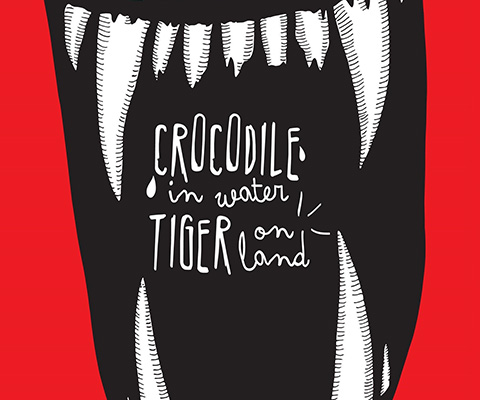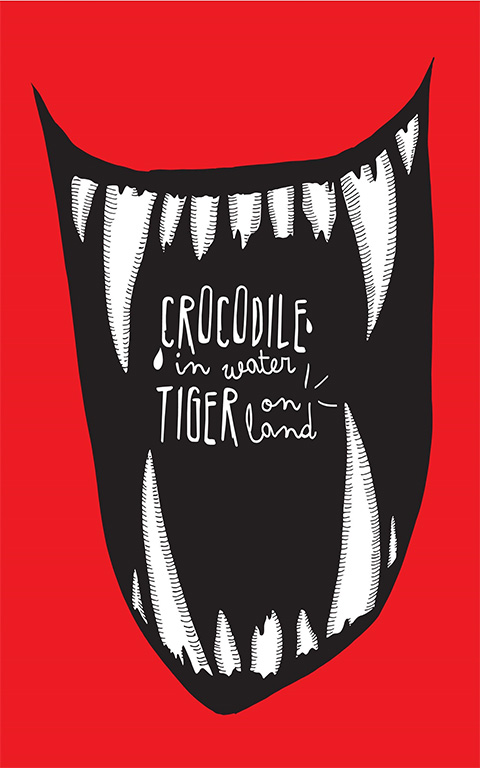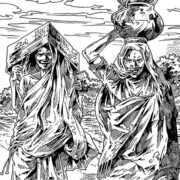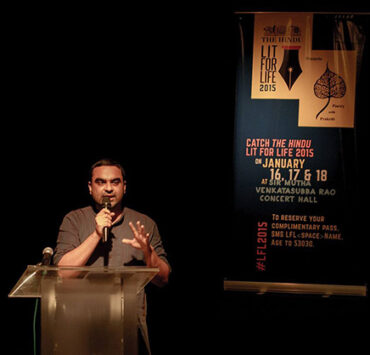The fans of webcomic Crocodile in Water, Tiger on Land know to expect their weekly ration of bite-sized, scalpel-sharp scorn on Monday mornings. Monday mornings, we are assured, are the best time of the week for insults. The comic’s authors are an unnamed duo from Kolkata, who started publishing back in 2010. Over the years, they have scribbled a small pantheon of flawed, familiar characters into being, through whom they unflinchingly pillory contemporary India.
Crocodile in Water’s satire is lucid, sometimes caustic, often directed inwards: two characters of the recurrent cast are avatars of the authors themselves—a man in thick-rimmed hipster-geek glasses; a woman wearing an unimpressed scowl. The comic has earned a dedicated audience of thousands, and this year, became a HarperCollins book.
The volume, a curated collection of strips from Crocodile’s back-catalog, complete with wry contextual notes, is bound in fire-engine red and emblazoned with an enormous fanged grin. And it’ll bite—or at least, nibble at your conscience. I read it twice in one sitting, and then emailed the authors. The below is a selection from our exchange.
Who are you, the authors of Crocodile in Water, Tiger on Land?
We are a woman and a man. One of us writes, the other draws.
How literal are representations of the authors in the webcomic?
Quite accurate, in some ways. They represent certain aspects of us. As do many characters in the strip. If you put them all together, you’d get us. On a bad day.
In the preface to your book you write of your characters, “they are us.” Do you mean that about yourselves as individuals, or are you pointing at your demographic?
Both. Our demographic is the advantaged class that takes for granted all the privileges—in terms of class, caste, religion, gender, etc., and therefore the massive advantage in terms of education, opportunities, and social mobility—that the accident of their birth provides them.
Can you tell me about your name? Why is the webcomic called “Crocodile in Water, Tiger on Land”?
It’s an old Bengali saying that describes the state of being stuck between a tiger that’s stalking you on land and a crocodile lurking in the water. Basically, there’s nowhere to hide. Similar to getting stuck between a rock and a hard place, or the devil and the deep blue sea, or Congress and the B.J.P., if you will.
How important is the concept of predation to your criticism of India?
It is important. Large chunks of citizenry are being preyed upon by some powerful entity or the other, in manners big or small. If you are in the Niyamgiri hills, it’s the mining giants backed by the armed wings of the state, if you are a small farmer, a large manufacturer is eyeing your land and wants it cheap. If you are an urban Internet user, the big telcos want to divide your bandwidth and charge you differential rates depending on your usage. The waters are shark-infested and we must not splash around too much.
Why do you think India needs satire?
We have terrible and highly visible clues all around us of everything that’s wrong with our society. It often shocks visitors, but for us, it’s just how things are. It’s what the caste system has drilled into us. It’s a culture of convenient denial. Even if you are progressive, you will not ask certain basic questions. At some level you accept that many of your fellow citizens will spend their lives under terrible conditions, working themselves to death without any significant improvement in their standard of living during their lifetimes.
The dominant economic model fits neatly into that notion. [The idea is that] the advantaged get all the opportunities, and the fruits of those opportunities—through consumption and investment—trickle down in a generation or two to the others. So it’s okay for them to have to wait. My posh lifestyle is helping some poor person’s grandkid.
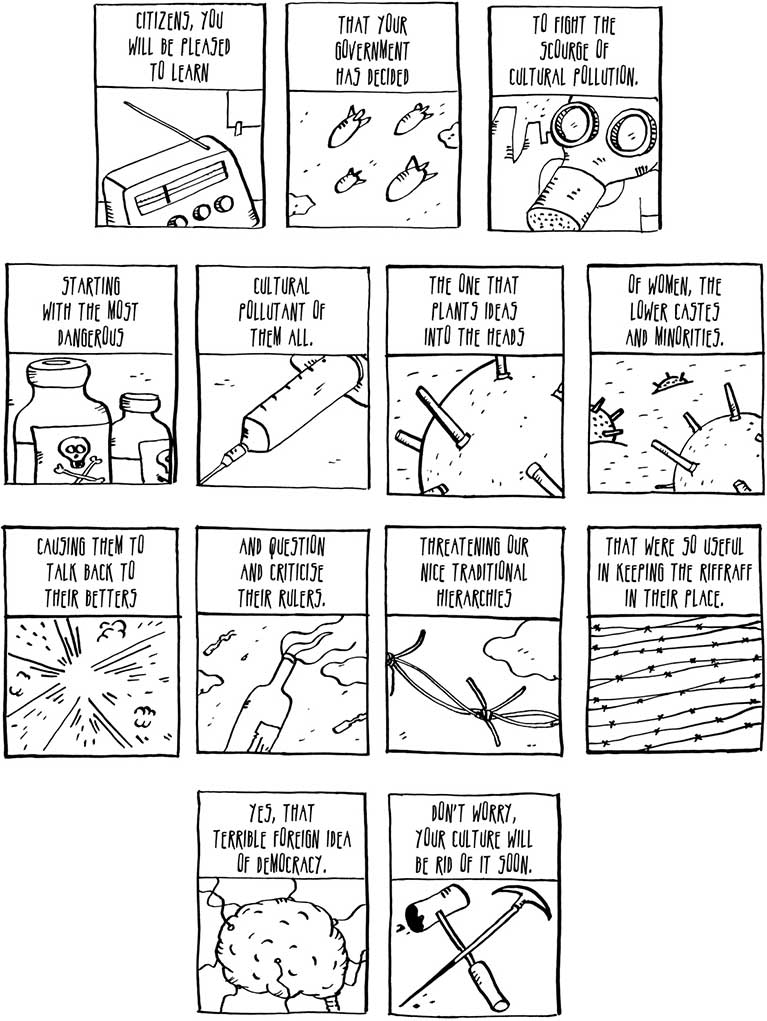
A Crocodile in Water, Tiger on Land strip published on September 14.
Now this is not entirely about the caste system; poverty spills over into all castes and religions. But this attitude, this legitimisation of inequality, the fact that we feel little shame or distress when a little girl wipes our windshield at a traffic light, is a legacy of our glorious ancient past—the one where our ancestors flew pilotless aircraft and conjured nukes out of thin air. If you are a kindly person, you’ll hand that little girl a blanket in winter, but you won’t ask the tough questions. You won’t treat it as an emergency, and call the authorities to get her to safety immediately, or [make sure] that there is a safe place where she can go to, fresh food to eat and a school for her to attend.
Satire is important because it’s one of the things that, through humour, has a bit of a chance of insidiously infiltrating that wall of denial. But, of course, it’s no instrument to change the world. It’s at best a little hiccup that you as a reader soon forget about, maybe until you are reminded with a new one.
Your consistent target is the iniquity, absurdity, hypocrisy of privilege in an unequal society. Often, it feels keenly self-critical. Is it important to call yourself out?
Of course, otherwise you are just a preacher, thundering from your soapbox. Why should anyone listen to you if all you do is criticise others?
Would you be proud if you knew that you had fostered in your (presumably privileged) readership, a similar propensity to wry self-critique?
Very. But we think it’s the other way around. We attract intelligent readers who have these qualities already. We think we are mostly preaching to the converted. That’s okay. We like it here.
Although your work is tough on a pretty broad cut of society, there’s significant warmth here, too. Warmth and sympathy tend to coalesce around the character of the dog. Can you tell me about the dog, and what he represents and accomplishes for you?
We love dogs. Some of our best friends are dogs. We humans have much to learn from them, and we say this in all seriousness. And that’s true for animals in general. They are wired into an older wisdom. You’ll know if you ever see the dignity of a dying animal. They understand how life works. They just get it.
The dog in our comic is the wise old (wo)man on the top of the hill. She says things that wouldn’t work if humans said it. By the way, we should add here that we have many cat friends too, and maybe we’ll have a cat character some day. We already have a crow.
What are the criticisms you face most commonly on your work?
That we are too obtuse, verbose, the illustrations suck, the language is stilted, the typeface is not readable (this is the most common one), and we are biased against ______ (this usually varies depending which particular strip is being criticised, so you can fill in the blanks). But to be fair, there’s not a lot of criticism. We have a much longer list of things which we should have done, or should do, differently.
Power is often drawn as a hand—especially a coarse, broad, brutish one. Modi’s hand is particularly hairy. Is there a reason?
That’s how you caricature, right? You take a dominant quality and exaggerate it. He is seen as powerful, decisive, strong. Someone who gets things done. And that projection is very male. We know women who have the above qualities but P.M. Modi is clearly a ‘man’ of action as opposed to a ‘person’ of action. Hence the hirsuteness. The character was designed for C.M. Modi, though. The 56″ inch chest hadn’t entered popular culture yet. That too would be an interesting symbol.




